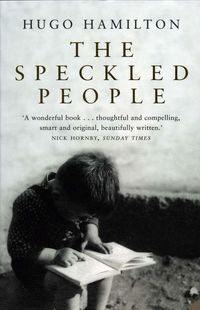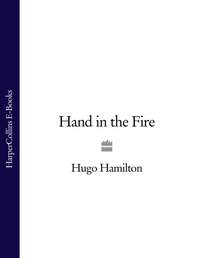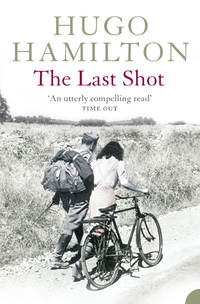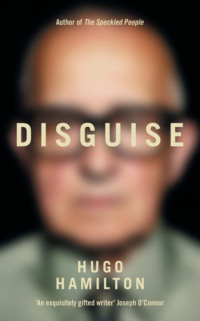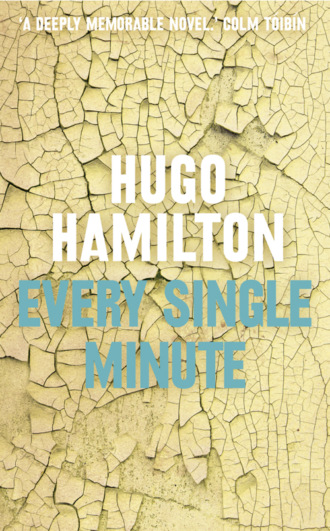
Полная версия
Every Single Minute

HUGO HAMILTON
Every Single Minute

Copyright
Fourth Estate
An imprint of HarperCollinsPublishers
77–85 Fulham Palace Road,
Hammersmith, London W6 8JB
www.harpercollins.co.uk
First published in Great Britain by Fourth Estate in 2014
Copyright © Hugo Hamilton 2014
Hugo Hamilton asserts the moral right to be identified as the author of this work
A catalogue record for this book is available from the British Library.
All rights reserved under International and Pan-American Copyright Conventions. By payment of the required fees, you have been granted the non-exclusive, non-transferable right to access and read the text of this e-book on-screen. No part of this text may be reproduced, transmitted, down-loaded, decompiled, reverse engineered, or stored in or introduced into any information storage and retrieval system, in any form or by any means, whether electronic or mechanical, now known or hereinafter invented, without the express written permission of HarperCollins.
Source ISBN: 9780007324859
Ebook Edition © January 2014 ISBN: 9780007468867
Version: 2015-01-09
For Mary Rose
Where can I find another brother, ever?
Sophocles/Seamus Heaney
Contents
Cover
Title Page
Copyright
Dedication
Epigraph
Chapter 1
Chapter 2
Chapter 3
Chapter 4
Chapter 5
Chapter 6
Chapter 7
Chapter 8
Chapter 9
Chapter 10
Chapter 11
Chapter 12
Chapter 13
Chapter 14
Chapter 15
Chapter 16
Chapter 17
Chapter 18
Chapter 19
Chapter 20
Chapter 21
Chapter 22
Chapter 23
Chapter 24
Chapter 25
Chapter 26
Chapter 27
Chapter 28
Chapter 29
Chapter 30
Chapter 31
Chapter 32
Chapter 33
Chapter 34
Chapter 35
Chapter 36
Chapter 37
Chapter 38
Chapter 39
Chapter 40
Chapter 41
Chapter 42
Chapter 43
Chapter 44
Chapter 45
Chapter 46
Chapter 47
Chapter 48
Chapter 49
Acknowledgements
Also by Hugo Hamilton
About the Publisher
1
She’s wearing those red canvas shoes. They’re in all the photographs. They’re there at the airport, while she’s being helped down the steps. They’re there in the Botanic Garden. At the Pergamon Museum. Also outside the opera house. They made her feel light on her feet. You know them, those flat canvas shoes with the white rubber soles and white rubber toe-caps and rough white stitching. Sneakers, people sometimes call them. Converse, if you prefer, with two rows of steel eyelets punched into the canvas for the laces, white laces. And two extra eyelets on each side for no other reason than to make them look more sporty, I suppose, more industrial maybe.
They’re there at the hotel, beside her bed. She’s sitting in her chair, ready to go out. She’s got white socks on, from some long-haul flight, I think, and I’m helping her on with the shoes, the red canvas shoes. I get the laces done up and help her onto her feet. I’ve double-parked the wheelchair next to her chair so I can swing her around, holding her by the elbows and letting her down slowly. I can hear her breathing.
Will she be warm enough? By right she should have some kind of scarf to put on because her neck is quite exposed. She says she’ll be fine, she can always hold the collar of her coat up.
She wanted to be brought to Berlin. I was bringing her. She loved travelling and it was her last wish to go somewhere away. Anywhere, she said. Anywhere away. So why not Berlin, I suggested, and she said yes, why not? Berlin was one of those places she had always been putting off and now she was afraid she might never see the city in her own lifetime. I love the way they do potatoes in Germany, she said. I want to see the Pergamon Museum. I want to see the Botanic Garden. I want to see the church that’s been left in ruins since the war.
This is different, she said to me a couple of times on the flight coming over from Dublin. She was actually crying in that photograph, taken by the flight attendant. She was crying and smiling at the same time, saying this is different, Liam. This is different.
I think she might have been afraid of what the photograph was doing to her. It was keeping her. It was keeping her and it was leaving her behind.
She kept saying it was different because there was a bit of travelling left in her and going to Berlin was giving her something to live for. It was like extra time, if you can call it that. There’s nothing wrong with me only I’m dying, she said. I suppose she was trying to laugh it off sometimes, doing her best to ignore the reality, you can understand that. She had all this energy, she wanted to see everything. All the galleries. All the museums, all the gardens, all the places unvisited before, the history, the whole place changing after the Berlin Wall, the way the city looks here and now, alive and breathing and remembering, everything we can humanly fit in, she said. She had a list made out, written on hotel paper, the itinerary, if you like.
I won’t forget this, she said to me.
She said she loved every single minute. She said she would remember this journey as long as she lived. I know that doesn’t make sense under the circumstances, but you know what she was getting at. What people say is not always word for word. She said a lot of hopeful things about the world and the future, because it’s hard to get out of the habit of looking forward and being optimistic. It’s hard to stop saying as long as you live, even though you can never tell how long that’s going to be for.
She only had a bit over a week after that.
She asked me to book tickets for the opera. She wanted to go to the Berlin State Opera, it’s not far from the Adlon where we were staying. Don Carlo was running at the time.
Verdi, she said. We have to go. The last time I saw Don Carlo was at the Met, in New York.
Unfortunately the performance was sold out. I called the reception at the hotel to see if there was any chance of them getting tickets for us. They were extremely helpful. They did say it was a bit late in the day, but they assured me they would do their very best and if there was a spare ticket to be found anywhere in Berlin it was hers.
I told her it was looking good.
Thanks, Liam, she said.
And then she pulls off the wig that she’s wearing. A full head of hair, with light brown curls, not unlike her own. She pulls it off with both hands like a child and throws it across the room as if she never found anything she hated as much. In fact, the first time she put the wig on she had to laugh. As if she was only pretending to be grown up, wearing something belonging to the adults, don’t I look very funny in this? You wouldn’t recognize her in those photographs if you didn’t know her. She looks so unlike herself without the curly hair, so uncovered. Her face is a bit puffed up with medication, swollen around the eyes. I think the real reason for the wig was so as not to frighten people, because she could see the shock in their eyes when they saw her head bare, how quickly this can happen to anyone.
I’m not wearing that thing, she says.
I don’t blame you.
I want to be myself, she says.
The wig is left lying on the floor like an animal that’s been run over on the motorway. I pick it up and carry it away, back to her suitcase.
Then I take off my cap and give it to her, because she can’t be going out with nothing covering her head. This is Berlin in May we’re talking about. We can’t be sure if it’s going to be warm or cold.
Here, why don’t you wear my cap?
What I have is a grey baseball-type cap, pretty ordinary, no brand name on it. She examines the cap in her hands for a moment. She makes no comment, she doesn’t look at herself in the mirror, she doesn’t trust mirrors. The cap fits her and I’m hoping she will keep it on, she looks great. I tell her it goes with the shoes, the red canvas shoes.
Now you look like Steven Spielberg.
She laughs.
Sure what does it matter? she says. I’m here in Berlin, nobody can see me.
And the way she said things like that you’d never forget. You’d recognize her anywhere by the way she spoke in a high voice, quite innocent, as if everything was new to her. Her voice was a girl. Her mind was a girl. She loved everything she didn’t know yet. She loved the whole idea of letting on that she knew nothing so that people would explain things to her very clearly, in simple words, and she would not be expected to say anything. She would tilt her head and listen carefully and wait for them to tell her things they might never say to a grown-up woman, or a man.
Nobody sees a child watching, she said.
Some of the things she said, I have to admit, didn’t make sense to me until after she died. While she was still alive I may have been prevented from understanding a lot of what she was saying until now, looking back. I know this sounds like a contradiction, but it’s hard sometimes to see exactly what’s in front of you until you get around to remembering. I hope this is accurate. I hope I’m getting it all in the right order. I’m only going by the photographs and the places we went to see. And what she said at the time might not be the same as what I remember she said.
2
The bag she had. She had this see-through plastic bag with a white zip across the top. I think it might have come with a pillow, or a duvet cover, something like that. It was a heavy-duty bag with proper white rope handles, completely clear with no product name, so you could see all the contents inside. Everything she had with her, all her belongings, if you like. From the outside you could see her purse, her medication, her tissues, her reading glasses, her passport, the key card for the hotel room, bits of newspapers she was keeping for later. A book she was never going to read. Her mobile phone, switched off. Things taken from the hotel room like free pens.
And chocolate. Lots of chocolate.
What are we only children? That’s what she said to me.
Not that she was stuck for a bag. She could have got herself any bag she wanted, only handbags were never a great priority in her life. That see-through bag was perfectly good, she said, too good to be thrown out. She held on to it for environmental reasons, obviously, but also to let people know that she was not the kind of woman who would spend a lot of money on a designer bag, that’s not who she was. She wasn’t here to make a big impression, it was only a bag to put her things into. I think she was making the point that her life was very open, nothing to hide. It could only have been her bag and nobody else’s, unmistakable. And it was handy being able to see into the bag from the outside while searching with her hand inside at the same time. Her hand became one of the items in the bag and the plastic made a squeaking sound while she was looking for something, her glasses, checking to make sure she had her glasses, with the wine-coloured frames. She had only recently bought them in New York and she told me that the optometrist had nice breath. She tried to get him into conversation, but all he ever said was look up, look down at the floor, look at my left ear. And the same thing again for the other eye, look up, look down, look at my right ear. He was so close in front of her that she got the smell of blackberries on his breath, like blackberry jam.
We’re only children. That’s it. We’re only just children, she said.
She liked to imagine that every day was the first day of her life. She loved being at the Adlon, a bit of luxury, she said. The foyer was wide, with a section cordoned off at the centre for tables and chairs where people sat having coffee and cake, a glass of champagne, like they had done for years, I suppose. There was a high dome lit up in the middle of the ceiling and a balcony overlooking the foyer where people could look down from above at the people below. The reception was to the left as you came in, that’s how I remember it, and a cocktail bar to the right. And there was a long marble corridor leading away to the back past the elevators. It was a calm place, all in all, even when it was busy, with a piano playing most of the time and voices chatting and the sound of the elevator doors. She loved meeting new people, for example the hotel staff. She got into conversation and made friends with them right away, asking them questions, personal questions like do you believe in ghosts? Do you have a boyfriend? What do you think of Lady Gaga? And they always responded truthfully, out of courtesy. She talked to them like she was one of the hotel staff herself, which she was once, long ago, in London, a chambermaid, if that’s what you still call room service now. She was like one of them, having a chat to fill in the time, keeping them from their work.
Her room was bigger, more deluxe than mine, overlooking the street with all the action. My room looked out over the inner courtyard with the flower garden. There was possibly a bit too much décor, if you ask me, needless use of natural resources. Wood panelling around the rooms, all very heavy and executive. Corporate, would that be the right word? And the bathrooms were something else, very spacious, marble tiling, beautiful towels that looked to me like they had never been used before, that was the feeling you got at least. Everything was very new and old-looking at the same time, new old. The place had been completely reconstructed since the wall came down, with no trace of the old place left, only the name and the reputation.
Sometimes I wonder what people get up to in hotel bedrooms, what mad things went on before me. It doesn’t bear thinking about, she said. Leave it alone, you don’t want to imagine. Because she worked as a chambermaid in London years ago and she’d seen everything that was worth imagining. It was her job to erase the evidence. A hotel bedroom is meant to have no trace of the previous occupants. Maybe all they ever get up to is look into each other’s eyes and say each other’s names, out loud.
So we’re all ready to go and she takes out the list from her bag. I’m pushing the wheelchair along the corridor towards the elevator. I call the elevator and she hands me the list to give to the driver when we see him.
We’re not going to call him the driver, she says. Are we?
We can call him Manfred.
Does he mind being called Manfred?
That’s his name, I tell her. Please call me Manfred, that’s what he said to me.
She wants to know, does he have much English?
Yes.
Don’t tell him, she says, will you?
She would prefer Manfred not to know about her condition. It’s not like her to withhold information from people, but keeping Manfred free from knowing that she is dying is not such a big lie, everybody does that.
She would rather not have to explain. She probably doesn’t want to go over those medical details again. What the doctors said, how they waved the X-ray around and then left her alone in the corridor. How they came back and told her that in spite of the bad news, she was as healthy as a trout. Her heart was in excellent condition, and her blood pressure was perfect. They were talking about her like spare body parts, she told me, as though they could reassemble the best available parts from a number of women into one decent woman they could stand over. The nurse even remarked about her elbows, how did she keep them so young, she had the elbows of a ten-year-old.
I’ve let him know you’re a writer, I tell her.
He doesn’t need to know any more than that, she says.
He thinks you’re my mother.
She laughs at that. Me, your mother?
Everybody loves mothers, I say, and she laughs again, with all her lungs.
I wouldn’t know how to be a mother, she says.
Ah that’s not true.
She’s not my mother, only Manfred has picked up that impression somehow because she’s a good bit older than me, in a wheelchair.
Just to be clear about this, she was definitely not my mother and there was no romance between us either, nothing like that in the past, no previous history. We were not attached to each other or living together like lovers, or married, or related in any compulsory way, like her family. We were good friends, that’s all. We met when things were a bit upside-down, for both of us. She was older in years, in books, in everything. She didn’t mind me knowing less than she did. She didn’t mind not knowing the first thing about cooking, I wouldn’t let her near a kitchen. We clicked, I suppose, just telling each other things, having a laugh. We took each other seriously, but not all the time. I used to call around to play with her dog, Buddy, throwing her shoe across the room to make him go after it, while she was reading. She had the ability to read as if there was nobody else in the world outside the book. Even with me running around her chair and Buddy after me, she would continue reading, even when I was hiding the shoe behind her back so that Buddy would have to jump right across her and the book would go flying out of her hands, only then she would look up and say, Liam, I’m going to kill you.
Manfred is waiting at the reception by the time we get down. As we come out of the elevator he is walking towards us and I get the impression that he has been walking towards us for some time, maybe hours, maybe days, maybe always was walking towards us. How did he know when to start walking, I’m asking myself. He’s got a shaved head and you wouldn’t say he’s overweight, just very big all round, in a physical sense, he does weights, it’s obvious. He’s wearing a suit and tie and his chest is expanding to an enormous size as he puts out his hand, smiling. The piano is playing somewhere, up at the balcony level, I think it was.
I give Manfred the itinerary and tell him that we can always change the order as we go along, and we’re open to anything else of interest that’s not already included on the list, if there’s enough time left. He looks at the list for a moment as though we might have the wrong city. She has everything listed all over the place, the way it happened in history. He points with his finger, blowing out air through his lips, lining the places up in some kind of order that would make sense to him geographically, as a driver.
And while I’m talking to Manfred, she’s looking back at the elevator we have just come from, staring at the old-fashioned dial above the doors, maybe wondering if that’s how Manfred guessed we were on our way down. It’s one of the features of the old Adlon which they have reinstated in the new Adlon. Like in the Hitchcock films. A dial pointing to the different levels like a clock, letting you know where the elevator is, in case you want to know.
Here, let me take your mother, Manfred says.
He grabs the handles of the wheelchair out of my hands and away she goes, wearing her cap and her red canvas shoes, holding the clear, see-through bag with all her belongings, nothing hidden. Down the marble wheelchair ramp at the side, through the automatic doors, out under the red canopy towards the tour buses waiting in the street. Manfred pushes her over to the car and opens the sliding door. And after she’s got into the car I discover that the sliding door closes electronically. Please leave it alone, Manfred says to me when I try to close it myself, manually.
In the square in front of the Brandenburg Gate there is some kind of demonstration going on. A small gathering of people with placards, more policemen than demonstrators. It’s all very calm, a lot of chanting, I think it’s for Tibet.
And Manfred is right, absolutely, she was like a mother. She gave advice like a mother, she asked questions like a mother, she bossed people around like a mother. You can’t have cake for your main meal, with beer. Eat something decent, Liam, look at you, the vultures would pass over you. That kind of thing she would say. As if she was responsible for me. But she would let you have anything you want after all, you could always get around her, and she insisted on paying for everything. She had a mother’s way of stepping into your life and giving a running commentary on everything that was going on, telling you what you were doing right or wrong while you were doing it. She cross-examined you like a mother, holding your arm and looking inside your head and saying out loud all the things you were keeping to yourself. She could guess what you were thinking. No wonder everyone thought she was my mother. She was like a mother to everyone. Indiscriminately. Even Manfred, the driver, she held his arm while he was helping her into the car, asking him questions until he told her that he was half-Turkish on his mother’s side and married with three children under ten. She said she was a hundred percent Irish and she would love to be half something else.
Maybe that’s what happens when you have no children of your own, you turn everyone else into children. She even spoke like a mother about Tibet.
God love them, she said, they only want to be themselves.
3
So we’re sitting side by side in the back of a large grey-coloured car and she’s telling me about the opera, Don Carlo. She’s saying it’s basically a big family story, not unlike her own. The conversation we have is quite random initially. She’s wondering about her dog. Will Buddy be all right, Liam, do you think? Yes, he’s perfectly happy, I assure her. She tells me to remind her about the sheets. The sheets, Liam, don’t let me forget the sheets. Because she has everything planned out in advance and it’s her intention to buy a new pair of sheets in Berlin to bring home with her to Dublin.
Manfred is taking us through the big park, past the golden angel, it’s been seen in lots of movies, and music videos. The day is sunny and there are people out walking with take-away coffees. Running with bottles of water. And dogs. Running with dogs. Cycling with dogs. Look at that, she says, pointing to a man cycling with a child inside a trailer cart attached to the back of his bicycle. Or is it two children? That’s not something you see very much of in Dublin, she says. She talks about the amount of women on bicycles without helmets. Right out in the middle of the traffic. She says you wouldn’t find her cycling without a helmet in any city now. We come out of the park and pass by a large yellow brick building in a modern design that looks like a pirate’s hat, she says. It’s the Berlin Philharmonic. Another place she would love to include on the list.
Then she tells me why she loves Don Carlo.
The plot is a bit complicated, from what I remember. It’s about a father killing his own son. The King is forced to hand over his son in order to keep his reign, that’s the outline in a simple sentence. It’s set in Spain during the Spanish Inquisition. The King is trying to bring order to the world by force and his son Don Carlos is against all that brutality, he wants to stop the killing and everyone to go home and live in peace with the person they love. Power is all that matters to the King. He’s addicted to power and he’s got to do everything to keep it, including killing his own son. It’s a terrible decision he has to make and he’s full of guilt and remorse, going against all his instincts as a father. There is an added problem. The son, Don Carlos, is in love with a French woman, but his father has already married her by force and made her the Queen. She still loves Don Carlos and Don Carlos is heartbroken. That gives his father a further reason for mistrusting his son and getting him out of the way. I know it sounds a bit simplistic, but that’s it, more or less, a big family drama.



